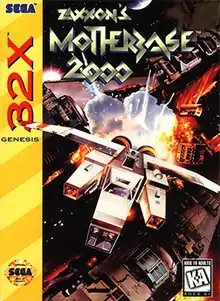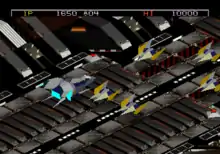Zaxxon's Motherbase 2000
Zaxxon's Motherbase 2000, known in Europe as Motherbase and in Japan as Parasquad, is a 1995 isometric-scrolling shooter video game developed by CSK Research Institute and published by Sega for the 32X. The North American version was rebranded to be part of the Zaxxon series due to its similar gameplay. Gameplay involves piloting a ship to destroy giant robots and enemy ships, while being able to capture enemy ships and use them as power-ups. Reception to Zaxxon's Motherbase 2000 was mixed to negative. While reception of the graphics was mixed, the gameplay has been panned as being of poor design.
| Zaxxon's Motherbase 2000 | |
|---|---|
 North American cover art | |
| Developer(s) | CSK Research Institute Corp. |
| Publisher(s) | Sega |
| Director(s) | Shinya Izumi Takeshi Niimura |
| Producer(s) | Hiroshi Aso |
| Designer(s) | Toshikazu Nagasato Yuichiro Kuroda |
| Programmer(s) | Makoto Nakamura Masanori Sato Tooru Kujirai |
| Artist(s) | Emi Kurabayashi Kiyoshi Fujita Yuzi Yamashita |
| Composer(s) | Masami Yitsuse Naoshi Kunisawa |
| Series | Zaxxon |
| Platform(s) | 32X |
| Release | |
| Genre(s) | Isometric-scrolling shooter |
| Mode(s) | Single-player, multiplayer |
Gameplay

Played from an isometric point of view, similar to the original Zaxxon,[1] the player flies a spaceship through various enemy bases with the goal of destroying enemy robots and craft. Additionally, the player's ship can enter into other craft, using the enemy craft as a power-up,[2] granting the player access to powered up blasters depending on the craft hijacked. The game also features two player head-to-head multiplayer.[3]
According to the game's manual, the story of Zaxxon's Motherbase 2000 involves a Hive Confederation, once a peaceful planetary system until the separation of the Ginglii clan from the Hive. The Ginglii have created a computer which can coordinate the production of weapons and have overtaken and enslaved Hive planets. A rebellion force has begun a mission, codenamed "Motherbase 2000", to get through the Ginglii defenses and reach the computer. The player's ship is called the Stinger.[4]
Several influences on the gameplay have been identified, most prominently Zaxxon, but also elements from Stellar Assault, Space Harrier, Metal Head, Xevious, and Viewpoint.[1]
Reception
| Publication | Score |
|---|---|
| EGM | 5.375/10 |
| Famitsu | 25/40 |
| Next Generation | |
| Video Games (DE) | 58% |
| Hobby Consolas | 75/100 |
Zaxxon's Motherbase 2000 received mixed reviews, despite positive coverage during development from Computer and Video Games.[5] On release, Famicom Tsūshin scored the game 25 out of 40.[6] The four reviewers of Electronic Gaming Monthly scored it a 5.375 out of 10. They especially criticized the removal of the ability to change altitude, which they regarded as one of the Zaxxon series's defining features, and all but one of the reviewers felt that the new jump ability was nearly useless. They approved of the 2D backgrounds but derided the polygon graphics as rough and the controls as sluggish, and generally agreed that the game was not as fun as previous Zaxxon games.[7] GamePro praised the jump ability as the game's only redeeming feature. Though they allowed that some shooter fans would enjoy the game, they felt the gameplay and graphics to be mediocre, and criticized that the game does not resemble the original Zaxxon strongly enough to justify using the Zaxxon name.[2] Spanish magazine Hobby Consolas scored the game 75 out of 100 points, praising the game's originality but criticizing its scrolling mechanic,[8] while German magazine Video Games scored the game at 58%.[9] French magazine CD Consoles criticized the game's graphics and sound, while giving moderate reviews of its creativity and gameplay.[10] Next Generation outright panned the game, arguing that the removal of the ability to change altitude strips Zaxxon of any interest. They also cited slowdown, glitches, and a poorly-designed two-player mode, and concluded, "Zaxxon's MotherBase 2000 is graphically ugly, slow, boring, repetitive, and a game that is truly unworthy of any stars. We'll still give it one star in memory of the much more playable original."[11]
See also
References
- "Motherbase". Mean Machines Sega. EMAP. July 1995. pp. 70–71. ISSN 0967-9014.
- "ProReview: Zaxxon's Motherbase 2000". GamePro. No. 82. IDG. July 1995. p. 46.
- Badziak, Ken (June 1995). "Zaxxon's Motherbase 2000". Electronic Gaming Monthly. No. 71. Sendai Publishing. pp. 128–129.
- Zaxxon's Motherbase 2000 manual. Sega. 1995. p. 3.
- "One Mother of a Game". Computer and Video Games. No. 161. Future Publishing. April 1995. p. 11.
- "NEW GAMES CROSS REVIEW: パラスコード". Weekly Famicom Tsūshin (in Japanese). No. 344. Famitsu. July 21, 1995. p. 31.
- "Review Crew: Zaxxon's Motherbase 2000". Electronic Gaming Monthly. No. 71. Sendai Publishing. June 1995. p. 36.
- "Lo más nuevo: Motherbase". Hobby Consolas (in Spanish). Axel Springer. August 1995. pp. 82–83.
- "Reviews: Zaxxon's Motherbase". Video Games (in German). Magna Media. July 1995. p. 100.
- "Les Critiques: Mother Base 2000". CD Consoles (in French). No. 9. July 1995. pp. 110–113.
- "Zero". Next Generation. No. 7. Imagine Media. July 1995. p. 69.